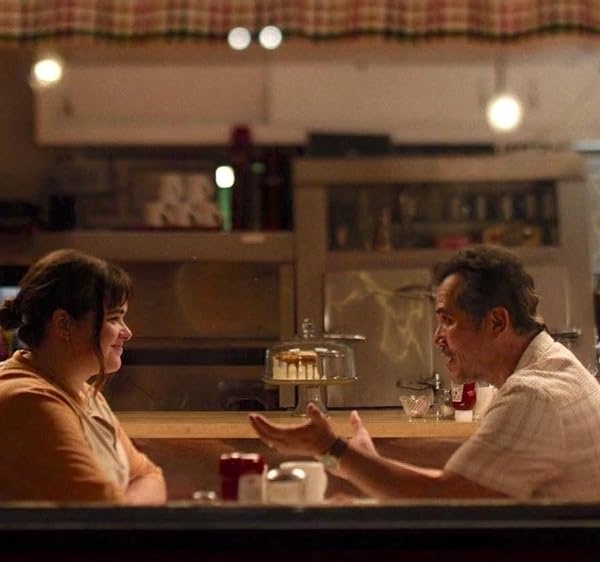
Partway into “All Shall Be Well,” the main character meets a lawyer friend in a bar one night. “Why did you wait so long to see me?,” the lawyer asks the other woman sitting across from her, regarding an ongoing dispute over an inheritance. “I thought we were all family,” replies the lead. After a light chuckle, the friend says, “Even mother and son fall out when money’s involved.” Set in Hong Kong, this deeply moving fourth feature from writer-director Ray Yeung (“Front Cover”, “Cut Sleeve Boys”) tenderly explores the aftermath of unexpected loss, where the uncertainty and chaos of the immediate grieving period is compounded by delicate negotiations that need addressing amid a very specific set of circumstances.
Both in their late sixties, Angie (Patra Au Ga Man) and Pat (Maggie Li Lin Lin) are a lesbian couple who’ve been together for over four decades. Previously factory-worker colleagues in their younger days, the pair later ran a successful textile factory of their own. Thirty years prior to the film’s starting point, Pat bought a spacious apartment where the pair have lived ever since. While out to their respective families and friends for a long time, Pat and Angie have never been able to marry thanks to Hong Kong’s laws still restricting marriage to heterosexual couples.
Angie has always been close to Pat’s older brother, Shing (Tai Bo, who led Yeung’s previous queer-romance drama, “Twilight’s Kiss”), and his wife, Mei (Hui So Ying), but especially to Shing and Mei’s thirtysomething children, Victor (Leung Chung Hang) and Fanny (Fish Liew Chi Yu), who call her “Aunty Angie”; Fanny also has two children who know Angie as their grandmother. Despite having the same upbringing as Pat, Shing’s successes in life have been minor compared to his assertive younger sister. Having lost his restaurant business some years back, the 70-year-old is now working a graveyard shift as a parking attendant, with no work benefits thanks to exploitative bosses.
Victor, meanwhile, is an Uber driver who only has a car at all thanks to financial intervention from both Pat and Angie. Victor brings his new girlfriend, Kitty (Rachel Leung), to a Mid-Autumn Festival dinner at his aunts’ place, where Pat breaks out an expensive whisky. This is not to show off or intentionally highlight the disparity in wealth between the assembled relatives, but because, as Angie says, “Sharing with family isn’t wasting.” After everyone has left this warm gathering at their apartment, Angie begins cleaning up, asking a question to an offscreen Pat, whose answer we never hear. In the next scene, we learn that Pat suddenly died in her sleep.
Expressing concern for the traumatized Angie’s health during her immediate grief, Mei takes on duties like initiating burial plans, after Angie says Pat told her she always wanted her ashes to be scattered at sea. But outward compassion soon makes way for ulterior motives and unexpected microaggressions. Mei and Shing steer things towards placing Pat’s ashes in a columbarium, following the advice of a Feng Shui expert, with the sister-in-law referring to Angie as having been Pat’s “best friend” when the columbarium staff ask about her relationship to the deceased. Thanks to the laws in Hong Kong, Angie has no rights in order to take control of her partner’s burial arrangements, meaning that Shing has the final say.
Despite presenting a very different queer experience, and operating in a more subdued register throughout, it is at this point that Yeung’s film draws favorable comparisons to Sebastián Lelio’s Oscar-winning “A Fantastic Woman.” While Angie is not victim to physical abuse or open hatred like trans woman Marina in that Chilean drama, she similarly finds her world crumbling after her live-in partner’s abrupt death, with the family of the departed controlling the farewell ceremony and setting their sights on the property the two had shared.
Angie’s sense of alienation from Pat’s family only grows after the burial. As Pat did not leave a will (apparently not wanting to finalize one until she turned 70), the law states that all of her inheritance will go to her next-of-kin, so her brother in this case. And because Angie’s name was not on the deed when Pat bought their apartment all those years ago, she has no legal claim to her home of three decades. Her future now lies in the hands of Shing, who doesn’t explicitly support Angie’s assertion that Pat would want her to remain in the apartment, given the love Pat had for her family as well as Angie.
Beautifully written and performed (Patra Au Ga Man as Angie being the standout of an excellent ensemble), “All Shall Be Well” illustrates Yeung’s keen eye for the nuances of social dynamics, especially regarding matters of wealth and class that many may prefer to skirt around when it comes to family. Much of the low-key film’s power lies in making every key player’s reasoning sympathetic, even when their words or choices are ultimately antagonistic towards the woman left in limbo by the law and fate. Convinced that Pat’s luck in life can be transferred to her underperforming relatives, Mei’s domination of the burial proceedings — and enlistment of a spiritual adviser, who may well be a con artist — is driven by a sincere wish to bring good fortune to her children and grandchildren.
Not solely told through Angie’s perspective, the film touches on how most ordinary people are priced out of the property ladder in Hong Kong. Still living with his parents, Victor tries finding an apartment for Kitty and himself; his only affordable options being in a garbage-strewn building in a seedy area, with little to no windows. Although long married to her high-school sweetheart, Fanny’s prospects aren’t much better, with the total space of her cramped apartment above a smelly restaurant — home to her, the two children, and her husband — being about the size of Pat and Angie’s dining space.
Given how out of reach a comfortable home can seem, it’s no wonder that the carrot dangling before them after Pat’s passing is enough to make even the most devoted nieces or nephews try rationalizing a move into their aunt’s home; questioning moral obligations to a loving woman they’ve known their whole lives. As the late Pat says in the film’s prologue, “Sharing with family isn’t wasting.” But as Yeung’s sensitive, intelligent drama demonstrates, it can certainly be far from easy.
Grade: A-
“All Shall Be Well” premiered at the 2024 Berlin International Film Festival. It is currently seeking U.S. distribution.







